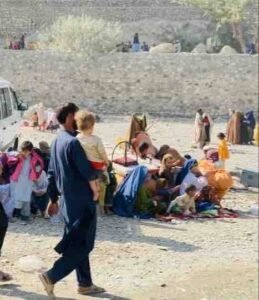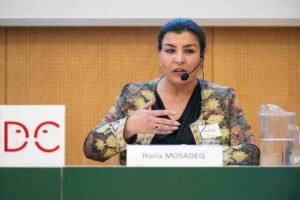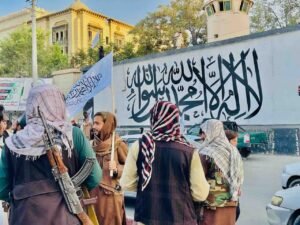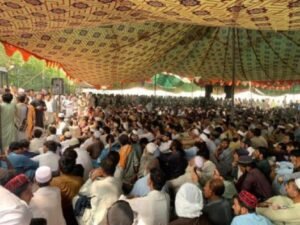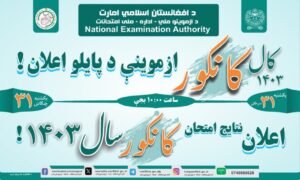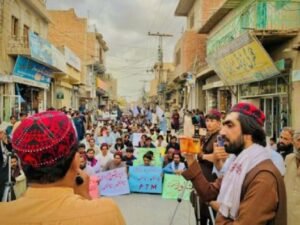Promoting Dialogue Between Diaspora Groups and Civil Society Individuals Working for Peace and Reconciliation in Afghanistan
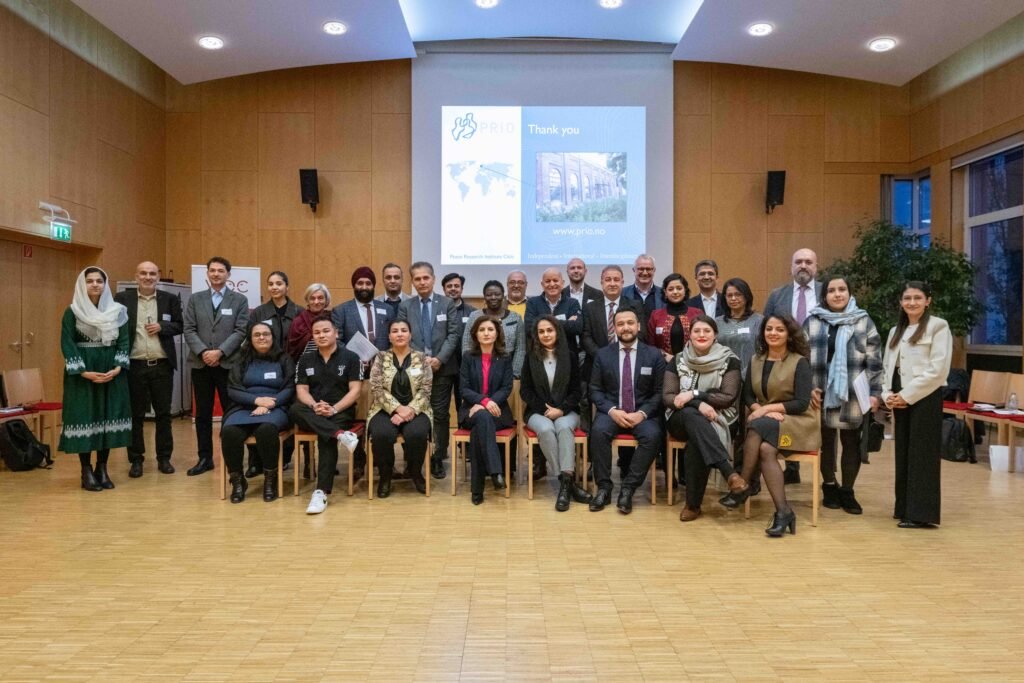
Members of the Afghan diaspora from nine European countries gathered in Vienna for a civil society forum to discuss the pivotal roles of diaspora and civil society actors in promoting peace and reconciliation. Photo: @OXUS
“As women, we bear the brunt of war, and any peace talks, negotiations, or reconciliation processes must prioritize and center the interests of women.”
By Ali Ahmad and Michael Fanizadeh
1 – 2 December 2023
In early December 2023, the Vienna Institute for International Dialogue and Cooperation (VIDC) convened a gathering of Afghan civil society organizations (CSOs) and diaspora groups from nine European countries. The two-day forum aimed to delve into critical discussions on reconciliation, women’s empowerment, youth and minority participation, and the proactive role that civil society in the diaspora can play in fostering a democratic and Taliban-free Afghanistan.
The inaugural day of the forum featured insightful presentations and discussions involving international researchers and members of the Afghan diaspora. Experts such as Kristian Berg Harpviken, a research professor at the Peace Research Institute Oslo (PRIO), Maximilian Lakitsch, a lecturer in the Department of Global Governance at the University of Graz, Austria, Brigitte Rath, a founding member of the Women International League for Peace and Freedom (WILPF) Austria, and Horia Mosadiq, the director of the Conflict Analysis Network (CAN) and a passionate advocate for human and women’s rights, shared their perspectives.The forum also hosted Wolfgang Petritsch, the President of the Austrian Institute for International Affairs, as a distinguished guest.
Three key issues were covered on the second day of the forum: a) fostering trust-building, social healing, and reconciliation; b) women’s empowerment and participation; human rights for everyone; and d) youth engagement and the involvement of minority groups in the peace process. The Afghan diaspora groups and members of civil society, comprising men and women from different ethnic, linguistic, and religious backgrounds, took part in these discussion sessions and critically explored the subjects.
Friday, 1 December 2023
Mixed session with international guests and experts (Language English)
- Taliban State Formation Process
On the first day, following the forum’s commencement by Michael Fanizadeh of VIDC, Kristian Berg Harpviken delivered a comprehensive presentation on the state formation processes of the Taliban. Harpviken elucidated the transformation of the Taliban from an armed resistance group to a governing entity, highlighting the consolidation of their power sources across ideological, economic, military, and political domains following their return to power.
The Taliban, who have ruled the entire country for the first time, have difficulty of going from being an armed resistance to a governing body while building on their prior experience in governance and many years of shadow government. Their unity is of utmost importance, and they prioritize upholding internal coherence. They are not interested in other groups’ noises, but rather their unity. Though they are perceived as Pakistan’s puppets, the Taliban aggressively pursue maximum independence and diversify their economic resources. With Iran acting as a model for comparison, the theocratic model is reflected in the continuous creation of the Taliban state, with an emphasis on the “temporary” nature of everything except the status of their Amir. According to Harpviken, the Taliban are building a theocratic state that sets them apart from other theocraciesacross the globe.
According to Harpviken, the Taliban seamlessly integrated the pre-existing state apparatus while imposing a top-down hierarchical structure within their organization. Threats, detentions, disappearances, abductions, and surveillance are just a few of the tactics used by the Taliban to control the population. “It is a harsh form of governance by all standards,” argued Harpviken. Notably, the Taliban has exhibited little flexibility regarding representative politics or the adoption of a power-sharing agenda with opposing factions.
Addressing the question of how to deal with the Taliban, Harpviken outlined three strategic choices for both the international community and the diaspora in navigating a Taliban-controlled Afghanistan. Firstly, the option of armed conflict against the Taliban, although advocated by some, was considered impractical given the lack of international support for military intervention. The second option was to isolate the Taliban and Afghanistan, but Harpviken noted that this approach had proven ineffective in the past. The third and more nuanced choice involved engaging in dialogue with the Taliban, albeit with political implications. Harpviken suggested that unless the Taliban undergoes a fundamental shift in their governance approach, internal dynamics within the Taliban will play a pivotal role in shaping any meaningful transformation.
- The Role of Reconciliation in Sustainable Peace
In his presentation, Maximilian Lakitsch provided an academic perspective that was quite broad and not exclusively focused on Afghanistan but rather centered on the broader theme of the role of reconciliation for sustainable peace. He presented an overview of international peace practice, referencing the UN’s post-Cold War strategy outlined in the Agenda for Peace (1992). Notably, Lakitsch emphasized that peacebuilding goes beyond ending armed violence; it involves addressing societal dynamics for long-term stability.
Lakitsch’s presentation delved into the complexities of achieving sustainable peace, exploring ways to enhance its effectiveness, and analyzing global conflict data from 1946 to 2018. He challenged the perception that the world is becoming more peaceful. He attributed this rise to fundamental issues in addressing societal divisions and conflicts.
„For peace to be sustainable, there has to be a united and reconciled society as its foundation. Otherwise, society falls back into violence,” Lakitsch said.
“Reconciliation is about a broken relationship,” Lakitsch said. He stressed the importance of recognizing past injustices, promoting forgiveness, and engaging in healing processes. He also highlighted the sensitivity and intimacy of the reconciliation process, emphasizing that it cannot be imposed externally and must come from the affected communities. Lakitsch criticized the limitations of international peace missions, citing challenges in understanding local dynamics and the failure of the local turn strategy. Recognizing and supporting local dynamics in achieving sustainable peace, urging a shift from idealized notions of peace to practical, community-driven approaches.
- Vienna Process for Democratic Afghanistan
“There is no other solution than to find a peaceful way to compromise and to come back to normal life again,” stated Wolfgang Petritsch during his presentation about why he started the “Vienna Process for a Democratic Afghanistan,” a biannual conference that he has organized in Vienna since the Taliban return to power in August 2021. Petritsch expressed his satisfaction at being among the members of Afghan civil society organizations and influential groups, highlighting that his presence was not coincidental. He asserted that he has been closely in contact with the director of VIDC, Sybille Straubinger, on various issues, with a particular focus on Afghanistan.
About two years ago, Petritsch was approached by a mutual friend and members of the Afghan resistance inexile. He was requested to convene a meeting for anti-Taliban Afghans who aim to construct an Afghanistan distinct from the vision the Taliban currently presents to the people of Afghanistan and the world. Despite initial reluctance, Petritsch, drawing from his experience as a former diplomat and peace negotiator, agreed tospearhead these significant talks. The first meeting took place in September 2022, followed by the second in April 2023 and the last one took place between December 3rd and 5th in Vienna. His primary motivation behind the initiative, though, is his desire to support Afghans in shaping a future for their country after over 40 years of civil war and external interventions.
According to Petritsch, there is a lack of interest from the West, particularly Europe and the United States, in understanding the aspirations of the Afghan people for change. He contends that there is a prevalent reluctance to address Afghanistan as a pressing political issue, distinct from the challenges posed by the Taliban. Petritsch, however, emphasized that there is a need for global support for those Afghans who strive for a peaceful Afghanistan. He highlighted the need for a democratic framework that considers the unique cultural and historical context of Afghanistan, recognizing the importance of compromise and coexistence. His key message for a peaceful Afghanistan was the idea of inclusivity, involving men and women, as well as diverse ethnic groups, in the process of building a new Afghanistan.
“The principles established in our inaugural meeting in September 2022 emphasize an inclusive approach, involving both men and women actively. It revolves around shaping the future of a country where 50% of the population must be actively engaged. Additionally, inclusivity extends to various ethnic groups, ensuring a comprehensive vision of what Afghan democracy can entail,” Petritsch stated.
Petritsch outlined the progress made in earlier two conferences with a focus on formulating a roadmap, assessing the current situation, and defining future objectives. He said that since the last meeting in April, members of the Vienna Process for a Democratic Afghanistan have developed this roadmap. He also pointed out that the details of this roadmap would be revealed in the meeting scheduled from December 3rd to December 5th.
Petritsch acknowledged the challenges of uniting positive forces in Afghanistan but emphasized that this unity should not prioritize political hierarchy over civil society. Instead, he advocates for a balanced approach where both pillars—strong civil society and political structures—are essential for a modern Afghanistan. “You do not only need a strong civil society, freedoms, human rights, and equality of genders, but also a political structure, rule of law, and judiciary to work and be in service of the citizens,” asserted Petritsch.
Petritsch expressed his pleasure that a few representatives from the civil society forum would be present at the Vienna Process for a Democratic Afghanistan conference on December 3rd, engaging with the participantsand sharing the main takeaways from their two-day discussion. “Afghanistan has a future. Afghanistan has a democratic future. Exile is temporary, and there will be an opportunity for return,” Petritsch concluded his presentation.
- Empowering and Amplifying Afghan Women’s Voices
“As women, we bear the brunt of war, and any peace talks, negotiations, or reconciliation processes must prioritize and center the interests of women,” asserted Mosadiq during her presentation on the vital role of women in any upcoming peace negotiations. She emphasized the need for global attention to the voices of Afghan people, particularly women.
Mosadiq addressed the complex dynamics of dealing with the Taliban, recounting personal experiences and highlighting the contradictory narratives regarding the group’s treatment of women. The lack of justice and accountability for human rights violations committed by both the Taliban and international forces during the two decades of U.S.-led NATO forces’ engagement in Afghanistan is decried, and Mosadiq expressed skepticism about the international community’s commitment to justice. She also expressed her frustrations with international institutions, especially the United Nations and the International Criminal Court (ICC). She called for the recognition of gender apartheid as a crime against humanity under international law and to label the Taliban as a gendered oppressor due to their systematic discrimination against women.
Mosadiq pleads for the international community to listen to the voices of Afghan women and to reevaluate their standards and practices. She underscored the need for critical solutions that acknowledge, prepare, compensate, and deliver justice to the people of Afghanistan. Despite her frustration and loss of faith in international institutions, there is an unwavering call for continued engagement to address the pressing issues facing Afghanistan and its people.
She narrated that the distinction between ‘good Taliban’ and ‘bad Taliban’ paralleled the narrative of labeling human rights abusers as either good or bad. This selective application of values has eroded her trust in the international community and the United Nations. “I’ve observed how principles, especially regarding human rights, can be conveniently changed when engaging with the Taliban.”
In reflecting on her experiences with the international community, Mosadiq said she and the group of women she was part of were actively advocating for the inclusion of women in the peace talks between Americans and the Taliban, which eventually ended up with the Doha agreement in February 2020, but the women’s voices were not heard.
She observed individuals who were formerly dedicated to peace now endorsing the acceptance of the Taliban as Afghanistan’s reality. She asserted her right and the rights of millions of Afghan women to be acknowledged as a reality of Afghanistan too.
“Unfortunately, we were actively knocking on the doors of every embassy in Afghanistan; we sought acknowledgment for our role in the talks with the Taliban. We emphasized that, as women, we continuously desire to participate in these discussions. We presented our concerns, outlining the conditions vital to these peace talks. Regrettably, we faced skepticism and were unjustly labeled as warmongers. Despite our sincere intentions for peace, we found ourselves excluded from various international platforms,“ recalled Mosadiq.
Mosadiq stands firm in rejecting the Taliban, warlords, and those responsible for the devastation and loss of hundreds of thousands of lives in her country. The actions and atrocities, including those committed by international forces led by NATO, have led to the displacement of millions of Afghans. The takeover of Afghanistan by the Taliban in August 2021 further underscores the urgency of listening to her pleas for a different course of action.
- Peaceful Feminism
The founding member of the Women’s International League for Peace and Freedom (WILFP)-Austria, Brigitte Rath, speaking at the forum elaborated on the organization’s diverse activities, including meetings, lectures, demonstrations, peace conferences, and supporting and empowering female refugees. WILFP places a particular emphasis on women’s empowerment, evident in its Afghan women’s group.
WILFP has a rich history dating back to its founding in April 1915 during the First World War. More than 1100 women from 12 countries gathered in The Hague to discuss the root causes of conflict and an end to the war. WILFP’s Austrian chapter was established only in 2021.
With its core objectives centered on preventing and ending wars, disarmament, and fostering sustainable peace and freedom rooted in social, economic, and criminal justice, WILFP remains committed to these principles. The organization emphasizes the importance of involving women and girls, especially those vulnerable to discrimination, in nationwide institutions for empowerment and peace-building. WILFP Austria stands at the forefront of advocating for a more just and peaceful world, echoing the sentiments of its global counterparts.
In August 2023, WILFP addressed the Austrian government, urging the provision of asylum for Afghan women and girls facing persecution, according to Rath. She stated that WILFP called for the implementation of human rights for families through expedited family reunification procedures and highlighted the need to leverage the knowledge of the diaspora to aid peace initiatives in Afghanistan. Despite financial constraints, WILFP demonstrated the impact of grassroots efforts through a small project. Collecting €6,000, the organization provided groceries to 55 vulnerable women and their families in Afghanistan, showcasing the potential of acknowledging hidden structures within the Afghan diaspora, stated Rath.
“Peace is life,” Rath concluded her speech.
Saturday, 2 December 2023
Internal exchange among Afghan diaspora and civil society representatives
(Languages Dari and Pashto)
Internal exchange among the Afghan diaspora and civil society representatives
The second day of the forum commenced with a brief recap of the first day. Sana Safi, the BBC journalist moderating the forum, highlighted the significant objectives for the participants. She stressed the importance of collective action and the exchange of ideas in a peaceful and respectful manner. Notably, all discussions on the second day were conducted in Afghan languages, Dari and Pashto.
The forum attendees then participated in three main sessions:
- Trust building, social healing, and reconciliation.
- Women’s participation and empowerment, ensuring human rights for all.
- Youth engagement and minority group participation in the peace process.
The results and recommendations of the group discussion were presented in the plenary session. The subsequent sections offer an overview of the pivotal discussion points and recommendations from each group.
Session 1: Trust Building, Social Healing and Reconciliation
Participants in this group recognized the intricate nature of trust-building and reconciliation among Afghans. They acknowledged that the prolonged war in their home country has led to a loss of trust among themselves, extending to the diaspora, diaspora organizations, civil society, and those engaged in Afghan affairs. The root cause is attributed to the scattered nature of the Afghan diaspora, fostering a pervasive sense of distrust. This fragmentation extends to diaspora organizations, which, despite sharing common objectives in various host countries, face challenges in forming a cohesive alliance. The group said, “The lack of trust has divided the Afghan diaspora.”
The group emphasized the critical need to define trust-building, urging a clear understanding of its components, although a concrete definition was not provided. Participants highlighted the importance of trust-building initiatives addressing internal divisions, with a specific focus on fostering trust among different age groups, genders, and ethnicities. The group identified challenges contributing to a lack of trust, particularly within the Afghan diaspora.
The participants emphasized a fundamental aspect of trust-building between men and women, pointing out historical disparities that hinder women’s active participation in governance and politics in Afghanistan. One member of the group expressed, “There is no recognition of Afghan women’s capacity. There are no women-led political parties. Women must be given the full chance to present themselves in all walks of life.”
Moreover, bridging the trust gap between the old and new generations is crucial. The older generation tends to blame the younger one for alleged detachment from Afghan culture, while the efforts of the younger generation are not valued. Conversely, the younger generation blames the older one for not working hard enough to pave the way for a peaceful Afghanistan. They believe that had the older generation created the groundwork, the younger generation would not be facing the challenges they do today.
Recommendations
The group proposed various mechanisms to overcome challenges and foster trust, contributing to the broader goal of reconciliation. These mechanisms include implementing trust-building through debates, workshops, seminars, media appearances, lobby events, and peace journalism. Key recommendations from the discussion group are as follows:
- Own and lead: The Afghan diaspora should take charge of the trust-building and reconciliation process, avoiding “foreign” intervention. Representation should be by Afghans to ensure alignment with their shared objectives.
- Cooperation and collaboration: The diaspora should collaborate with international non-governmental organizations (INGOs) at different levels. Establishing trust and seeking support for social healing from INGOs were emphasized. Trustworthy organizations should be established by the Afghan diaspora to form institutional relationships with entities in the country of residence.
- Networking: It is crucial to leverage the resources available in European countries for the Afghan diaspora, such as financial and political capital. Utilizing these resources to create new narratives and build networks across the continent was recommended.
- Media and online platforms: Peace journalism promotion and increased engagement in public speaking, advocacy, and lobby groups were recommended. Fellow diaspora members were encouraged to actively participate in promoting Afghans‘ interests. They stressed the importance of considering commonalities over differences, acknowledging that unity prevails.
In conclusion, the participants recognized the multifaceted problems of Afghanistan and the diaspora, advocating for a comprehensive approach. This approach involves the trust-building mechanisms outlined, genuine representation, and a focus on common objectives to overcome challenges.
Session 2: Women’s Participation and Empowerment, Ensuring Human Rights for All
“The issue of women should not confined to women alone; it is interwoven with every segment of society. It is inseparable. Any response made against the Taliban should be led by women. Every anti-Taliban opposition must include women in their ranks,” emphasized a participant during the discussion of the topic.
The group discussion revolved around the current situation of women, the challenges they encounter under Taliban rule, and potential solutions. To enhance women’s engagement in political, cultural, and economic realms, participants proposed a two-phase approach. Firstly, a preparatory phase involving information dissemination, awareness-raising, self-awareness promotion regarding women’s rights, utilization of existing capacities, and awareness-building among Afghan women in the diaspora. Secondly, there should be a focus on women’s empowerment, with a slight emphasis on technical aspects like finance and economics. The group suggested various strategies, including the use of social media, online platforms, educational initiatives, and the creation of scientific content for empowerment.
Recommendations:
- Prioritizing women in negotiation: It was emphasized that the issue of women should take precedence in negotiations between the Western world and the Taliban. Participants expressed the view that, thus far, women’s issues have not been a priority for the West. The assumption is that the West prioritizes a secure Afghanistan and a lack of threats emanating from its soil, as well as a reduction in poppy cultivation. These factors have led to a diminished focus on women’s concerns when dealing with the Taliban. Diaspora should use their leverage to put pressure on key stakeholders to hold the Taliban accountable.
- Legal framework: Through a legal framework, the rule of the Taliban must be challenged by drawing examples from other Islamic countries such as Indonesia and Malaysia, aimed at enabling women’s education and exerting pressure on the Taliban.
- Financial Resources: Creating a donation box in which diaspora can contribute, collect money, and send it to Afghanistan in case of emergency. They also recommended incorporating local and traditional tools to bolster the financial resources available to women.
- The role Afghan diaspora: The Afghan diaspora should create a new narrative for the future of Afghanistan. They should define what type of governance can shape the future of Afghanistan, whether based on voting systems or otherwise. The participants blamed the diaspora for a lack of cohesion and individual work. They suggested a platform in which the diaspora should mobilize for collective action.
The conversation delved beyond a few recommendations. Participants expressed skepticism in the international community, emphasizing the need for Afghan-led solutions. Concerns were raised about the absence of fresh and inclusive narratives within anti-Taliban movements, including former Mujahidin, republicans, and the National Resistance Front (NRF), lacking genuine initiatives for Afghanistan’s future. They underscored the importance of broadening the focus on women beyond education and employment rights, considering them as fundamental rights for every human being. There was unanimous support for equal rights for women and men, with a call for sustained narratives on women’s issues.
Session 3: Youth Engagement and Minority Groups Participation in Peace Process
The final group discussion explored the challenges of youth and minority groups’ involvement in peace processes, offering key recommendations. The group initially addressed challenges faced by Afghan youth and minority groups within Afghanistan. They rejected the terms “minority” and “majority” to avoid implying privilege, emphasizing that the majority refers to those opposing the Taliban. The discussion then shifted to challenges encountered by the Afghan diaspora in various host countries.
The group participants emphasized that over 60 percent of Afghans are under 25 years of age (UNFPA Afghanistan), posing an immediate risk of youth unemployment leading to susceptibility to radicalization. They highlighted the Taliban’s increased establishment of madrassas (religious schools) that indoctrinate and radicalize youth. The new educational curriculum in these madrassas recruits young individuals with limited job opportunities, leaving them with no alternative but to join. Additionally, youth face broader challenges, including social and health issues.
Beyond the challenges faced by Afghan youth within Afghanistan, the participants in the discussion highlighted the struggles of Afghan diaspora youth. These challenges encompass cultural shock, educational disparities, and psychological pressure. Discrimination and racism were identified as significant obstacles that contribute to poor integration.
Recommendations:
- Online Platforms: Utilize systematic online platforms to counter Taliban’s radical narratives. Promote online programs for debates and experience-sharing to enhance understanding of Afghanistan’s culture and its diaspora. Leverage social media for constructive dialogue between Afghans inside Afghanistan, the diaspora, and host nations.
- Advocacy: Establish a structured civil society group for engaging in debates and discussions about Afghanistan. Advocacy efforts should encompass facilitating scholarship programs and disseminating educational content to counter radicalization at both ends of migration. Similarly, the diaspora’s mobilization of resources and their strategic utilization in key engagement spheres is crucial. It should also entail efforts to bridge the gap between hosting nations and Afghan diaspora communities.
- Inter-Cultural Programs: Increase cultural programs, including learning Afghan languages, with an emphasis on depoliticizing language. Produce videos, poetry, music, and language programs. Cultural programs can aid the integration of Afghan youth in Europe and serve as a tool to connect them with home country.
In conclusion, the group proposed that, to prevent a mass exodus to Europe, EU Member States should address the challenges faced by Afghanistan and its people. Hosting nations within the EU should allocate more financial resources, offer psychosocial support to Afghans, and combat discrimination and racism in various countries of residence. The participants urged the establishment of a direct line of communication with the Afghan diaspora community, emphasizing the importance of unity within the diaspora for effective engagement.
Conclusion
Following a two-day forum with the theme “Promoting Dialogue Between Diaspora Groups and Civil Society Individuals Working for Peace and Reconciliation in Afghanistan,” attendees resolved to schedule additional sessions to go deeper into the topics. They looked into the possibility of setting up a permanent secretariat to supervise and plan the next discussions on behalf of the civil society forum. But the success of any next meetings depends on how actively the Afghan diaspora participates and whether funds are available to support their events and continued advocacy efforts.
Ali Ahmad is a Vienna-based researcher focusing on migration and diaspora studies.
Michael Fanizadeh is a project coordinator with VIDC.
Note: The contents of the article are of sole responsibility of the author. Afghan Diaspora Network will not be responsible for any inaccurate or incorrect statement in the articles.

